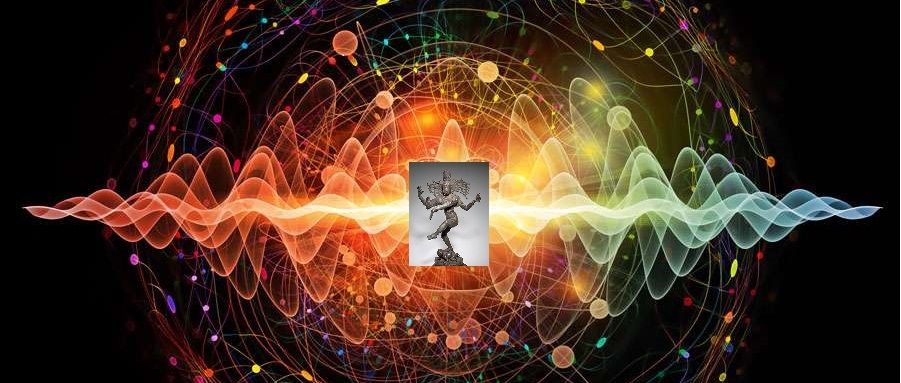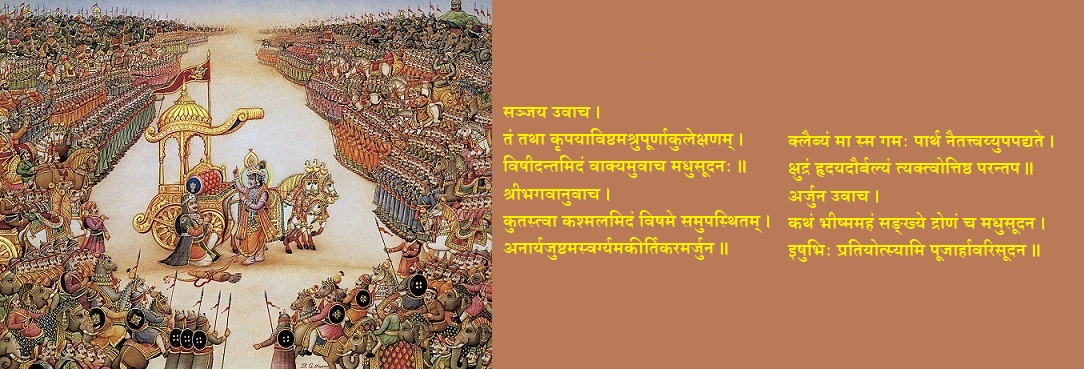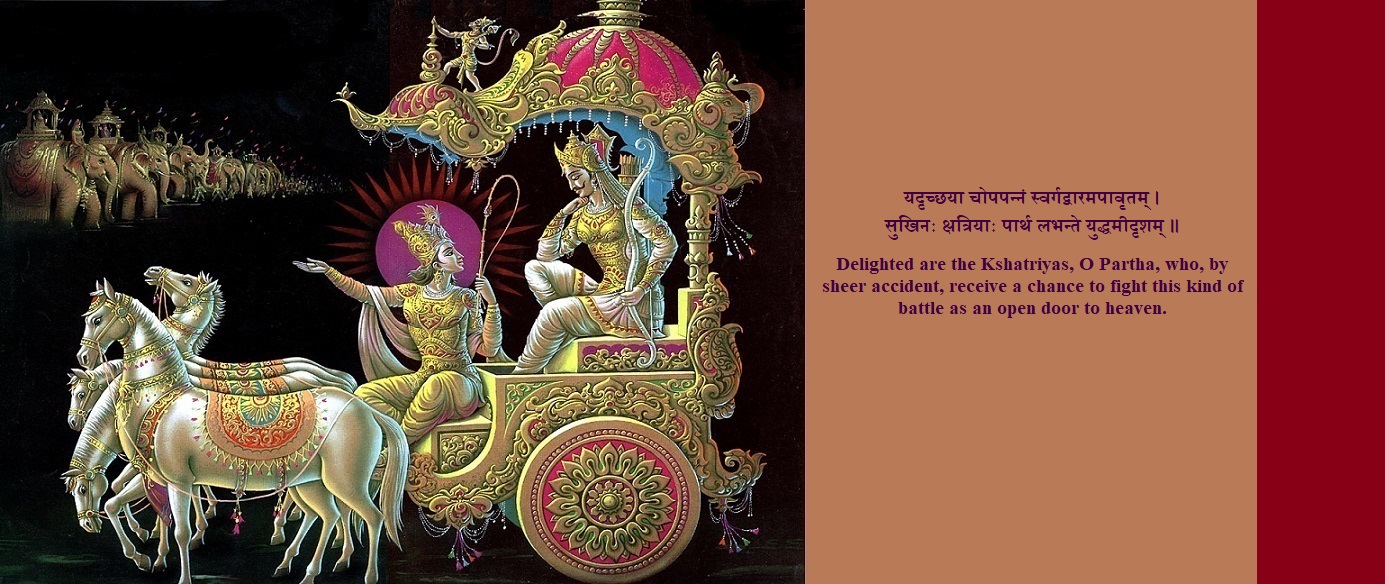The Bhagavad Gita, Chapter 1, Verses 26 ...30
Translation
There Arjuna saw fathers and grandfathers, teachers, maternal uncles, brothers, sons, grandsons, friends, and fathers-in-law standing in both the armies.
Seeing that those who are standing battle-ready are entirely relatives and soulmates alone, the son of Kuntī (Arjuna), despondent and filled with compassion owing to a spell of para (पर) or the Transcendental, spoke these words.
Annotation
In any published commentary on the Bhagavad Gita, we are only likely to read that Arjuna has seen his family men and friends in both the armies, standing prepared to fight. “When the son of Kuntī (Arjuna) saw all these kinsmen thus arrayed, he was overcome with great compassion and uttered in sadness:” [The quote is an example from a published commentary on the Gita.] Our investigation here is whether we could gain a more profound insight into what has happened to Arjuna. The deeper we go into the Gita, the more suggestive its import turns out to be. We would not bring any extraneous arguments, but go only by the poet’s own words.
From the size of each army division (akshauhini), we notice that the two armies together have deployed four million people on the battlefield. The family men and friends of Arjuna may comprise a few hundreds, probably. And we think Arjuna worries about those few hundreds. Is that all?
Let us examine the words Vyāsa uses in verse 26 and the former half of verse 27: he says, “Arjuna saw fathers, grandfathers, teachers, maternal uncles, brothers, sons, grandsons, friends, and fathers-in-law standing in both the armies.” All the words the poet uses here are plurals. Is Arjuna upset about his own fathers, grandfathers, brothers, etc.? Yes, he has his brothers and sons on the battlefield. But, how do we explain these words: fathers, grandfathers, grandsons? Neither his nor Duryodhana’s father is present there. What about grandfathers? Bhīshma is considered the grandfather of the Kurus, but not the direct grandfather of either the Pāṇḍavas or the Kauravas. Significantly, the word used is again a plural ̶ grandfathers. There are no grandsons of the Pāṇḍavas and the Kauravas in the two armies. Still, the word used is grandsons.
Another noteworthy fact is what we have heard just now are not Arjuna’s own words! Arjuna has not yet spoken after he has made his observation of the two armies. [His direct comments are available from the latter half of verse 28. We have now read only until the first half of verse 28.]. What does that mean? Sañjaya has read Arjuna’s mind and is describing what his thoughts and feelings are. We know Vyāsa gave Sañjaya a special/divine vision before the beginning of the war and he is appropriately using it in every significant situation he encounters. In order for us to grasp the mystic philosophy, we should not miss the techniques and devices the poet employs.
What does Sañjaya’s description say? Arjuna sees, at present, both the armies in their entirety; in each soldier present on the battlefield, he sees a father or a grandfather, or a grandson, etc. Each one is somebody’s father, or somebody’s grandfather, or somebody’s grandson! The four million people are, therefore, fathers, grandfathers, teachers, maternal uncles, brothers, sons, grandsons, friends, and fathers-in-law. If they all are going to perish in this battle, how many millions are going to lose their fathers, grandfathers, grandsons, etc.?
In these verses, we note, Sañjaya brings out that Arjuna’s concern is for the entire multitude of soldiers before him. This is not an ordinary concern. He describes beyond doubt how the two armies appear to Arjuna: those who are standing battle-ready are entirely relatives and soulmates alone [tān avasthitān sarvān bandhūn suhṛdaḥ eva cha (तान् अवस्थितान् सर्वान् बन्धून् सुहृदः एव च)]. It is nothing but Arjuna’s undifferentiated vision of humanity in the millions assembled at Kurukshetra. Such is the state of his personality at the moment.
Everyone in the two armies is for sure a relative or friend of some other person outside the battlefield. There are relatives among the soldiers as well. But Arjuna’s vision at the moment is such that he sees, in every soldier present on the battlefield, his own relative and/or soulmate only; that is the meaning conveyed by sarvān bandhūn suhṛdaḥ eva cha (सर्वान् बन्धून् सुहृदः एव च). In Verse 27, when mentioning each relationship, sakhīn (सखीन्) is the word used for friends. But at the end of the same verse, Vyāsa uses the word suhṛdaḥ (सुहृदः) to denote the totality of Arjuna’s perspective of all the army men he observes. The closest translation of the word is perhaps soulmates. The sound hṛd (हृद्) in the word suhṛdaḥ (सुहृदः) means heart or soul, which should mean Ātman or Brahman in an atmosphere being set up to teach Brahma-vidya. It then suggests Ātman causes to Arjuna a unitive (yogic) vision of the multitude of human beings! Such a vision means to Arjuna that the ongoing war (or any war) will kill only his own people or philosophically the manifested beings of his own Self. No wonder he is in deep distress, the reason for which is not easy for an ordinary mind to discern.
[Also, a worldly fact is that, except for a few criminals on the Kaurava side, most of the others are innocent human beings assembled there to discharge their duty as paid soldiers.]
If those thoughts are genuine, arising from deep within Arjuna’s heart, what has influenced the unconquerable hero? Vyāsa says: saḥ kaunteya kṛpayā parayāvishṭo vishīdann-idam abravīt (सः कौन्तेयः कृपया परयाविष्टो विषीदन्निदमब्रवीत्). Here is the crucial phrase that decides what Arjuna’s present state is and why he has a unitive (yogic) vision of humanity in the soldiers on the battlefield: kṛpayā parayā āvishṭaḥ (कृपया परया आविष्टः). [First line of verse 28] We translate this phrase as “filled with compassion owing to a spell cast by para (पर) or the Transcendental.” Para is an important word used in Vedanta to express the Transcendental, which denotes Brahman. And the word āvishṭa means entered or possessed (as by an evil spirit). Here Arjuna is not possessed by an evil spirit, but Sañjaya has ‘seen’ para or the Transcendental has seized him. It is a known fact in Vedantic parlance that the universal compassion Arjuna feels happens only in a transcendental state.
Vyāsa asserts it by using the phrase parayā āvishṭaḥ kṛpayā, which means “filled with the concomitant compassion when seized by para, the Transcendental (Brahman)!” What does it mean to us when we hear para has caught hold of Arjuna? He is going through a trance, a mystic experience or kshudra samādhi. Kshudra here means short-lived. So, Arjuna experiences a fleeting samādhi. But he has no clue what has happened to him. We know about his curious vision and the despondency he goes through only because Sañjaya has described them so well.
Let us keep this in mind when we watch what happens to Arjuna further. Only for this short-lived mystical experience his compassion and love, at this moment, is of unlimited nature. And he feels sad too. He sees himself in everybody and everybody in himself ̶ the typical yogic vision, which the Bhagavad Gita explains. The grief he suffers out of supreme compassion is also typical of the yogic state. Arjuna’s kshudra samādhi, of which he is unconscious, is of yogic quality. Thus, Chapter 1, although not teaching any Yoga Śastra, has earned the title of Arjuna Vishāda Yoga (Yoga of the Despondency of Arjuna).
Seized by the Transcendental, the mighty Arjuna has turned so tender that he has become a slave of his own compassion and love for all beings. Jñāneśvari* puts it in an exquisite, metaphorical language:
“The bee that can pierce through any piece of wood is caught in the delicate petals of a flower.” Under the influence of para, “He (Arjuna) would rather lose his life than cut through the softness that imprisons him.”
In such a state, in which he is not worried about losing his life, he could obviously stay fearless between the two armies sending missiles to each other.
What Arjuna chances to see now is the same as that we hear in these words of Swami Vivekananda: “The infinite oneness of the Soul is the eternal sanction of all morality, that you and I are not only brothers (every literature voicing man’s struggle towards freedom has preached that for you) but that you and I are really one. This is the dictate of Indian philosophy. This oneness is the rationale of all ethics and all spirituality.”
[We will include soon a note based on real-life accounts of mystic experiences, as found in books published in recent times.]
[*The great Mahrātta Sage of the 14th century, Jñāneśwar Mahārāj’s spoken discourse, translated into English by Manu Subedar, under the title, “The Gita Explained by Dnyaneswar Maharaj”.]
Translation
Arjuna said: O Kṛshṇa, seeing all these men of my own, standing here eager to fight, my limbs fail and my mouth dries up. I get also goose-bumps on my body. The Gāndīva slips and is about to fall from my hand, and my skin burns. I have no energy to stand either; my mind seems to whirl round.
Annotation
The poet gives every detail of the totally unfamiliar experience of a kshudra samādhi Arjuna goes through. Vyāsa wants to illustrate that an altogether foreign experience, as this, can very well unsettle even a hero of Arjuna’s stature. The mental stress he suffers is perhaps because of the thought that millions of his fellow men will lose their lives in the war. (The symptoms of acute mental stress described here are endorsed by modern clinical psychologists.) We have seen he is overcome by compassion for all the men standing in both the armies. At this moment, he does not differentiate people because, for the right reason, he experiences the intuition that they are the manifestation of the one Self (Ātman). In the earlier verses, Sañjaya has shared the inside view of Arjuna’s self and has unequivocally stated that he sees in all the soldiers his relatives and soulmates. Now when Arjuna speaks, the word used is svajanaḥ, which is also used as a synonym for relatives, but the word, if literally translated, will mean my own people or my own men. (sva means one’s own and janaḥ means people or the world.)
Arjuna is thus under tremendous distress at the thought that they (his own people in millions) are about to perish. In a mystic experience, what occurs to one is not a mere thought, but a vision of what is going to happen, which can be petrifying. The symptoms are the failing limbs and the drying up of mouth. In contrast to the symptoms of his present distress, he gets roma-harshaḥ (रोम हर्षः). It is usually translated as hair standing on end. The word harshaḥ (हर्षः) in Sanskrit implies an inner bliss; Arjuna recognizes he experiences an indefinable bliss, along with the unbearable anguish. We should not mistake the bliss to be the happiness of ordinary life. It is symptomatic of the transcendental state of samādhi.
Further indications of Arjuna’s extreme stress are his burning skin, inability to stand erect, lack of strength to hold his bow, the Gāndīva. And finally, his mind becomes thoroughly confused, whirling round, apparently owing to a severe conflict taking place in his inner self, brought about at this point in time by dharma-śarīra.
[The contemplative research on Arjuna's vishāda yoga was inspired by the speeches of Swāmi Nirmalānanda Giri Mahārāj.]
--------------------
(To read the next post [Gita Post #10] click/tap on this link: https://www.ekatma.org/node/188)
If you have not subscribed yet,







Comments (4)
Thank you Baiju for sharing this new perspective. Really well researched, very detailed work. My namaskars to you.
Thank you, Sanjay. Namaste!
Amazing interpretation. Why other writers missed these important points of teh scripture?
Thank you. Namaste!
Leave a comment